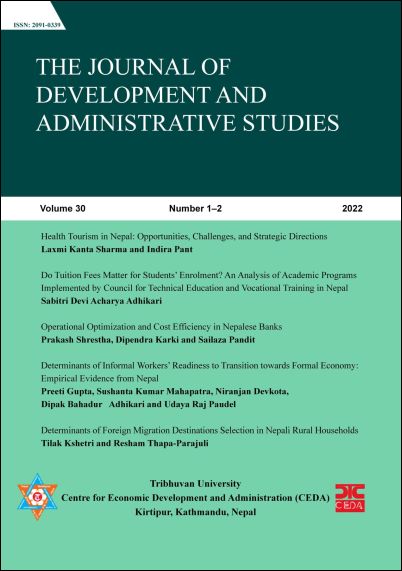Determinants of Informal Workers’ Readiness to Transition towards Formal Economy: Empirical Evidence from Nepal
DOI:
https://doi.org/10.3126/jodas.v30i1-2.69527Keywords:
Transition economy, Informal sector, Formal economy, Labor market, Logistic regression analysisAbstract
The informal sector in Nepal plays a significant role, encompassing over 70% of the economically active population. However, informal workers face numerous challenges, including violence, exploitation, lack of rights, and inadequate protection against income loss due to sickness or old age. This study examines the readiness of informal business sectors in Kathmandu Valley to transition to formal business sectors. An analytical research design was used, involving 400 respondents from the informal sector. The study evaluated the readiness index based on legal and policy frameworks, socioeconomic status, employment, structuralism, and income status. The findings reveal that informal business owners are generally ready to transition to the formal sector. However, higher income from informal activities is negatively associated with the likelihood of transitioning, indicating that workers earning sufficiently from informal work are less inclined to move to the formal sector. The study suggests that formalizing vocational training, enhancing insurance and security measures, implementing legal policies, and addressing income disparities are crucial steps to encourage the transition of informal workers to the formal economy.
Downloads
Downloads
Published
How to Cite
Issue
Section
License
The copyright of the accepted articles is reserved by the Centre for Economic Development and Administration (CEDA), Tribhuvan University (TU). No part of the article published in this journal should be reproduced except provided by the law currently in force without the written consent of the centre.




